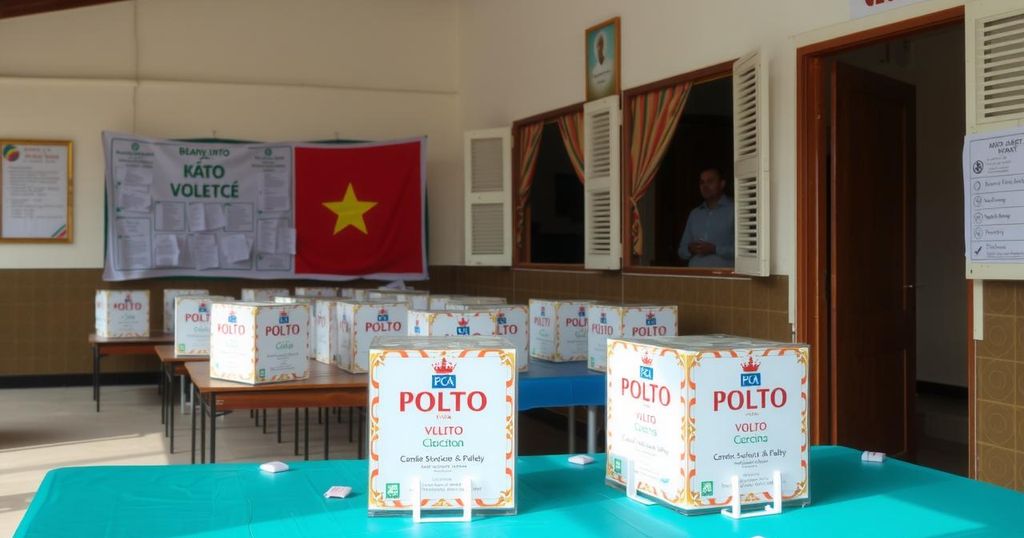World news
ABDALLAH SAMBI, AFRICA, AUSTRALIAN ASSOCIATED PRESS, AZALI ASSOUMANI, COMOROS, ELECTION FRAUD, GOVERNANCE, GOVERNMENT, HAMIDOU KARIHILA, HOPE OF THE COMOROS, INDIAN OCEAN, INDIAN OCEAN ARCHIPELAGO, JUWA, NO, NOUR EL - FATH, OPPOSITION, POLITICS, PRESIDENTIAL ELECTION, REUTERS, SUPREME COURT
Ethan Kim
0 Comments
Comoros Voters Cast Ballots for 33-Seat Parliament Amid Controversy
Comoros is holding elections for its 33-seat parliament, a year after a disputed presidential vote. President Azali Assoumani, facing allegations of authoritarianism, has been in power since 1999. Approximately 338,000 voters are registered, and results will be announced by Friday.
Voters in Comoros are casting their ballots today for the election of the nation’s 33-seat parliament, a significant political event occurring one year after President Azali Assoumani’s controversial re-election, which the opposition claims was marred by extensive electoral irregularities. The ruling party has categorically denied these allegations, stating their commitment to free and fair elections. Approximately 338,000 voters are registered to participate in this election, which represents the first parliamentary election since January 2020.
The Supreme Court of Comoros has approved nearly 100 candidates to run in the election. President Assoumani, who has been in power since a coup in 1999, is facing accusations of authoritarianism. Detractors are particularly concerned that he is preparing his eldest son, Nour El-Fath, to succeed him after his current term concludes in 2029. In 2024, Assoumani granted his son significant authority over governmental operations, further fueling speculation regarding a dynastic succession.
While certain political parties, including Juwa, led by former President Ahmed Abdallah Sambi, have called for a boycott of the electoral process after Sambi’s life imprisonment sentence in 2022, other opposition factions have chosen to participate. Among those advocating for participation is Hamidou Karihila, a candidate from the Hope of the Comoros party, who remarked, “The Azali regime is weakened … by participating in these elections we are contributing to further exposing the flaws in its system and accelerating its inevitable fall.”
The results of the election are anticipated to be released by Friday, marking another critical moment in the political landscape of Comoros. Efforts to restore trust in the electoral process will continue to be a pressing issue as the country moves towards potential reform and stability.
The political situation in Comoros has been marked by instability and allegations of electoral malpractice. President Azali Assoumani, who has maintained control since a military coup in 1999, has faced severe criticism from opposition parties regarding his governing style, characterized by alleged authoritarian practices. The recent parliamentary elections follow a contentious presidential election that raised concerns over electoral integrity, prompting ongoing discussions about political reform and legitimacy in the archipelago nation. The presence of multiple parties, some advocating for a boycott, reflects the divided nature of Comorian politics in the face of longstanding governance issues.
In summary, the parliamentary elections in Comoros stand as a pivotal moment for the nation’s political trajectory, overshadowed by past allegations of corruption and authoritarianism under President Azali Assoumani. With significant opposition involvement despite calls for boycotts, these elections may serve as a critical test of the political landscape and the potential emergence of new governance dynamics in the archipelago. Voter participation will be crucial in shaping the future of Comorian democracy, with results expected shortly after the polls close.
Original Source: www.thesenior.com.au




Post Comment